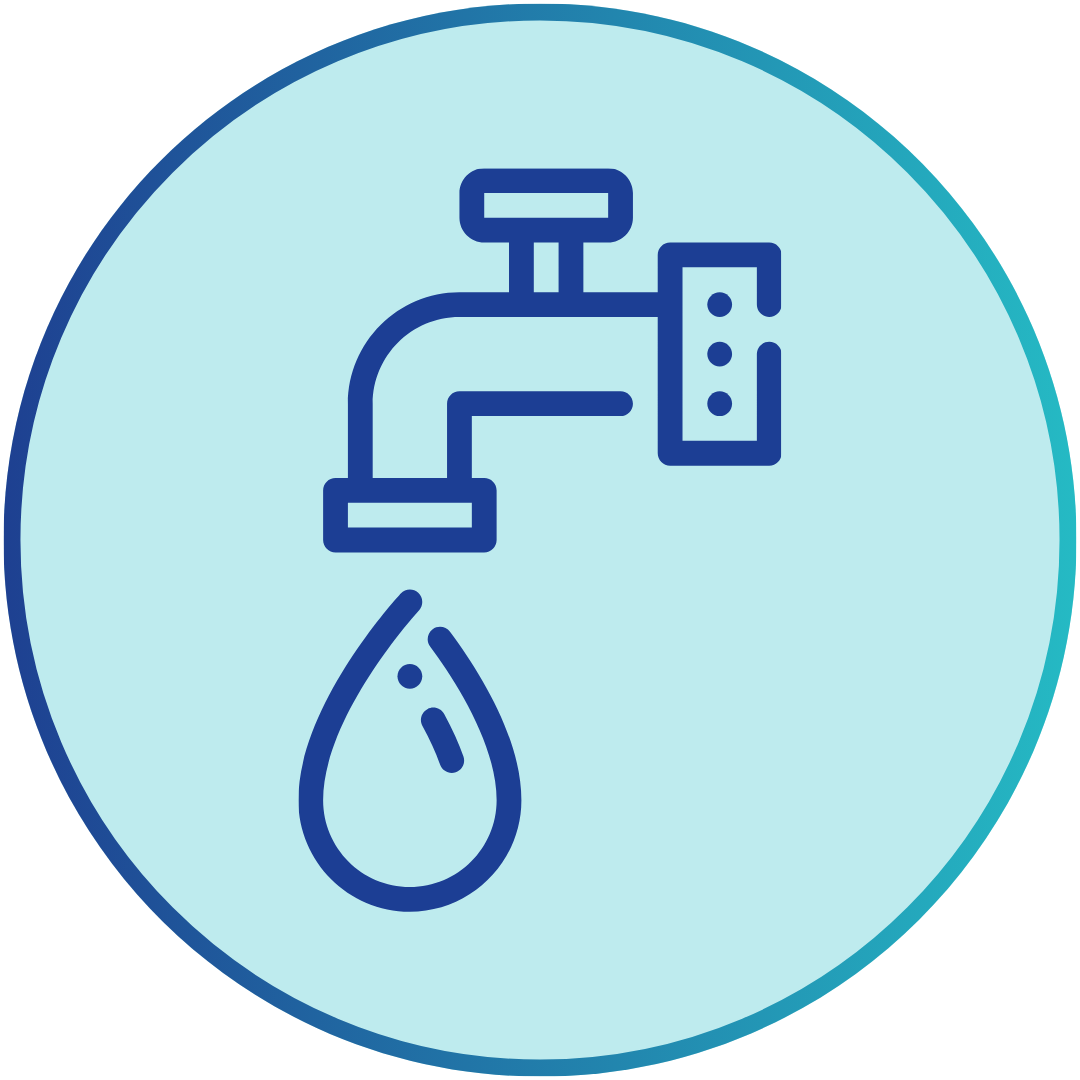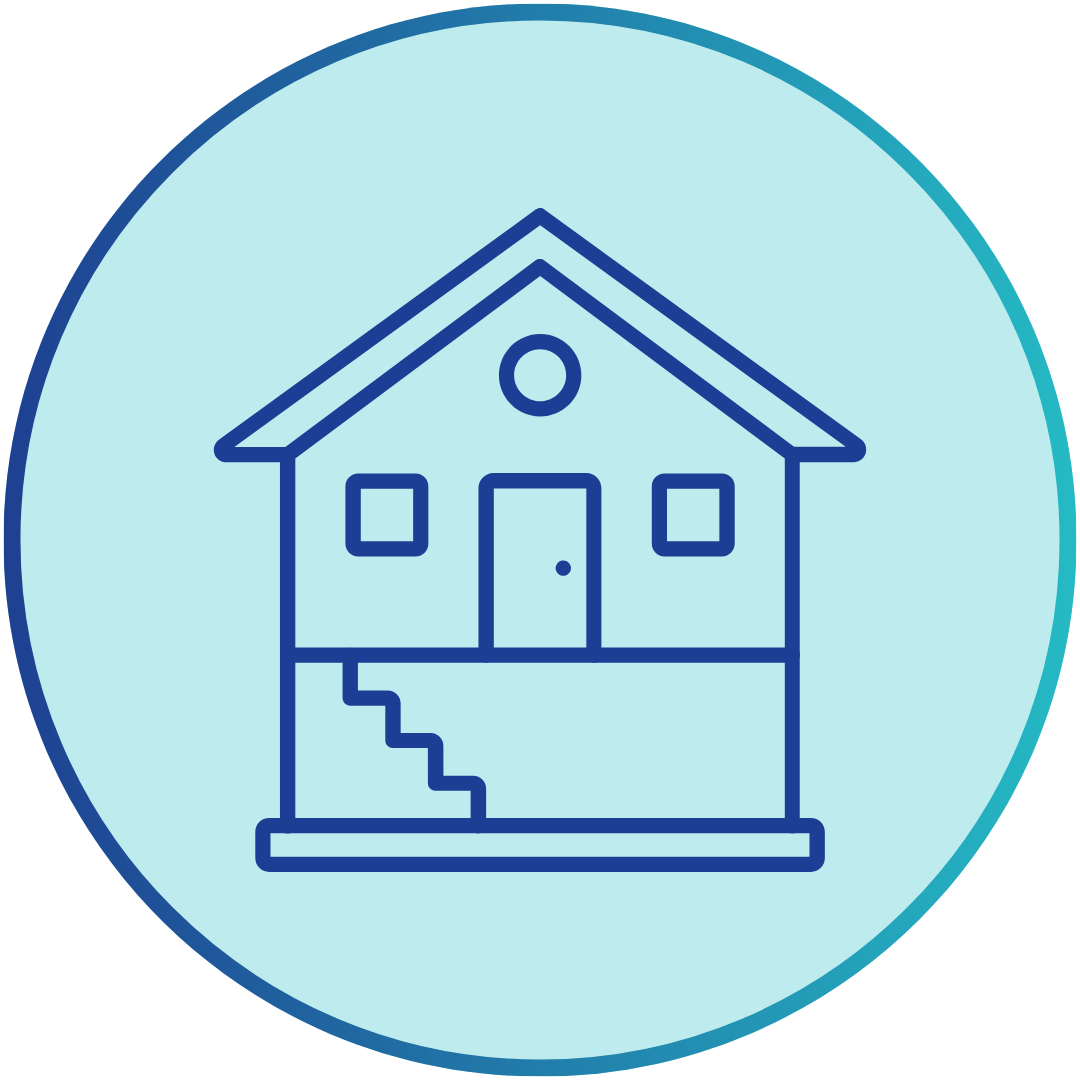 Public Water vs. Private Wells
Public Water vs. Private Wells
Do you know where your home’s drinking water comes from? Whether it is from a public water service provider or from a private well, it is important to understand your home’s drinking water supply.
Public Water
If you are connected to public water, a water line enters your home from the public water system. In Fairfax County, our drinking water comes from the Potomac and Occoquan Rivers. Water is treated and piped to our homes where we use the clean water for drinking, cooking, cleaning, and plumbing. Here are three things to know:
- Water main shut off: Know the location of your water main shut off valve.
- Billing: Homes connected to public water receive quarterly billing, likely through Fairfax Water.
- Responsibility: As a homeowner you are responsible for the water line into the house starting from the street lateral.
Private Well Water
For homes that use a private well, water is provided from an aquifer in the ground on your property. Groundwater is the largest fresh water supply, and protection of this resource is vital. Here is what you should keep in mind:
- Annual sampling: It is recommended you sample your well water every year.
- Heath Department services: The Division of Environmental Health collects water samples to conduct testing in our lab and inspects well head and components. Request a Water Sample test today.
- Well information: For questions about licensed well contractors, where your well is located, or how it works, contact the Division of Environmental Health. Call 703-246-2201 or email HDehd@fairfaxcounty.gov.
Need Help?
- Public water issues: Always contact a licensed plumber for plumbing problems inside the house or elsewhere on your property.
- Private well issues: If you have problems with your water line, well, or well components, contact a licensed well contractor. For any other water or plumbing issues inside the home, contact a licensed plumber.
![]() Keeping your kitchen safe is key to a Healthy Home. Remember these four crucial steps.
Keeping your kitchen safe is key to a Healthy Home. Remember these four crucial steps.
- Clean: Wash your hands thoroughly before and after handling foods. Clean surfaces and utensils to prevent cross-contamination.
- Separate: Keep raw meats away from ready-to-eat foods to avoid harmful bacteria from spreading.
- Cook: Know the right temperatures for cooking various foods to kill harmful bacteria. Use a food thermometer to make sure your food is cooked thoroughly.
- Chill: Properly cool cooked food and refrigerate leftovers within two hours.
Understanding Foodborne Illness
Foodborne illnesses often show symptoms 24 to 48 hours after eating contaminated food. Remember, the food that made you sick isn’t always what you just ate. Always avoid spoiled/moldy food and never consume food that smells off.
Handling Power Outages
During a power outage, keep refrigerator doors closed as much as possible. Perishable food can stay safe for up to 4 hours.
![]() No one wants pests like rats, mice, bats, or cockroaches in their homes. Here’s how to keep these pests out:
No one wants pests like rats, mice, bats, or cockroaches in their homes. Here’s how to keep these pests out:
- Seal those gaps: Check your home for any gaps, cracks, holes, or openings and seal them up. Don’t give pests an easy way in.
- Clean up: Regularly clean up food and water sources to make your home less inviting.
- Use screens: Keep door and window screens in good condition to prevent mosquitoes, flies, and other pests from entering your home.
- Travel smart: When traveling be vigilant about bed bugs in your accommodation. Don’t let bugs hitch a ride back home.
![]() If mosquitoes and ticks are bugging you, our on-staff mosquito and tick experts are here to provide you guidance and recommendations. We offer:
If mosquitoes and ticks are bugging you, our on-staff mosquito and tick experts are here to provide you guidance and recommendations. We offer:
- Free Yard Inspections: Learn how to manage mosquitoes in your yard with a free yard inspection.
- Tick Identification: Found a tick? Use our free identification service and get advice on how to deal with it.
Need Help?
- Pest Control: If you have a pest issue, contact a licensed pest control professional. The Division of Environmental Health does not perform pest control services on private property.
- Yard Inspection: If you need a yard inspection, complete the Mosquito Inspection Request Form. You can also call 703-246-2201 or email HDehd@fairfaxcounty.gov.
- Tick ID: Complete the Tick Identification Form. For help call 703-246-2201 or email HDehd@fairfaxcounty.gov.
![]() Ever wonder what happens to your water when it goes down the drain? In Fairfax County, most homes and businesses are connected to the public sewer system but about 21,000 properties use onsite sewage systems. Here is some information you need to know.
Ever wonder what happens to your water when it goes down the drain? In Fairfax County, most homes and businesses are connected to the public sewer system but about 21,000 properties use onsite sewage systems. Here is some information you need to know.
Public Sewer System
For homes connected to public sewer:
- From Your Home: The sewage exits your house through a single pipe.
- Underground Journey: It connects to larger underground pipes and flows to a sewage treatment facility.
- Billing: You will receive quarterly billing, likely through Fairfax Water.
- Responsibility: As a homeowner you are responsible for the sewer line from your house to the street lateral.
Onsite Sewage System
For homes using an onsite sewage system:
- Septic Tank: sewage exits your house and enters a septic tank.
- Onsite Treatment: All sewage treatment occurs through a private system on the property.
- Maintenance Reminder: The septic tank must be pumped at least every 5 years.
- Malfunction Risk: Prevent issues by not overusing the system, keeping pipes in good condition and avoiding clogs from fats, oils, and grease. When you protect your pipes, you protect your home from sewage back up or sewage surfacing on the ground.
Need help?
- Inside plumbing problems: Contact a licensed plumber.
- Outside, on your property issues: Contact a licensed septic contractor.
- Questions: For help with licensed septic contractor or understanding your system, contact the Division of Environmental Health at 703-246-2201 or email HDehd@fairfaxcounty.gov.
![]() Play a part in preserving Fairfax County’s high quality of life and protect natural resources by following trash and recycling laws. By recycling and disposing of trash responsibly, we help our community stay clean and healthy.
Play a part in preserving Fairfax County’s high quality of life and protect natural resources by following trash and recycling laws. By recycling and disposing of trash responsibly, we help our community stay clean and healthy.
Keep Pests Away
- Secure Your Bins: Make sure trash bins are properly closed or have tight covers to keep pests, like rats and flies, away.
- Stay Clean: Keep your property clean and free of trash both inside and outside to prevent bugs and rodents.
Trash Pickup Services
- Private Collection: The majority of trash pickup in Fairfax County is through private collection companies.
- County Services: The Fairfax County Department of Public Works and Environmental Services serves residents who live in Solid Waste Collection Areas (Sanitary Districts).
- Municipal Pickup: Residential trash pickup is picked up by the local municipality in the City of Fairfax, City of Falls Church, Town of Herndon, and Town of Vienna.
See information for County Collection Customers
![]() Cleaning up after and caring for your pets is essential.
Cleaning up after and caring for your pets is essential.
- Remove pet messes: Remove feces, fur, and any other messes your pet may leave. These may contribute to trash and allergens.
- Store pet food securely: Keep pet food in a sealed container. Don’t leave extra food outside where it could attract pests.
- Rabies: This is a disease caused by a virus that is nearly 100 percent fatal in mammals, including humans. Learn more about rabies.
![]() Swimming pools are a great way to beat the heat. Water safety is critical to prevent accidents and waterborne illnesses.
Swimming pools are a great way to beat the heat. Water safety is critical to prevent accidents and waterborne illnesses.
- Keep Everyone Safe: Pools should be fenced to prevent accidents. Kids, adult, and even pets, can fall in and drown.
- Maintain Your Pool: Test Water quality frequently especially before each use. Good maintenance ensures everything is working properly and the water is safe.
Pool Inspections
- Commercial pools: The pools in places like recreation centers, hotels and communities are maintained by onsite employees and are routinely inspected by Health Department.
- Residential pools: Homeowners/residents are responsible for their backyard pools. The Health Department does not inspect these pools.
Need Help?
- If you have questions about testing your water or about why properly functioning pumps and filters are important, contact the Health Department Division of Environmental Health. Call 703-246-2201 or email HDehd@fairfaxcounty.gov.
 Radon
Radon
Radon is a colorless, tasteless, odorless gas that can be found in homes. Radon can cause serious health problems like lung cancer. Testing for radon should be done during the winter months. Here is how you can test to protect yourself:
- At-home test kits: Kits can be purchased at hardware and home improvement stores and are available from the Virginia Department of Health.
- Professional Testing: You can hire a qualified tester to do a radon test for you.
Mold
Mold thrives in moist areas. Prevent mold:
- Keep spaces dry: Prevent mold growth by maintaining dry conditions.
- Remediation: If mold appears, have it removed professionally.
- Note: Health Department does not perform indoor air testing or remediation for mold.
Need help?
- Renters: If you have water leaks or flooding in your rental unit, report it immediately to your landlord or apartment management company. If the problem cannot be resolved in a reasonable amount of time, contact the Fairfax County Department of Code Compliance at 703-324-1300 or see the Code Compliance website to learn more on how to resolve this issue.
Lead
Lead is a highly toxic metal that can be found in older paint, plumbing, and around our homes. It can also be found in some foods/spices, toys, and ceramics/dishes/pottery.
Need Help?
- If you are concerned about lead exposure, contact the Health Department for a lead assessment. call 703-246-2201 or email HDehd@fairfaxcounty.gov.
- If your concern is associated with a private well, collect a water sample to test for lead.
![]() Make your home safer by routinely securing and storing firearms and medications. This helps to prevent unauthorized access and unsafe use.
Make your home safer by routinely securing and storing firearms and medications. This helps to prevent unauthorized access and unsafe use.
- Lock Firearms: Unload and lock firearms in a proper storage device and include trigger locks. Lock ammunition separately from the firearm. Model responsible behavior around firearms.
- Lock Medications: Lock prescription medications, including pet medications, to keep them out of reach of those who may misuse them. Proper storage and disposal of expired and unused medication protect the environment and help prevent misuse and accidental poisonings.
- Talk Safety: Have conversations with your family and friends about firearm and medication safety, substance misuse, and mental health. Normalize these conversations as part of a healthy home, family, and community.
Complaints?
To submit a complaint, use the Planning and Land Use System (PLUS) portal.
- Visit PLUS page
- Click on the “Enforcement” tab
- Click on “Submit a Complaint” to begin the process.
Your complaint will be send to the appropriate agency. You can submit complaints anonymously without a PLUS account.

